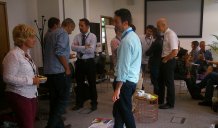Articles

ESI academics and Environment Agency staff: developing partnerships, strengthening the evidence base, identifying ways to collaborate. Image by Alex Huke.
The Environment Agency at the ESI
The Environment and Sustainability Institute (ESI) recently hosted meetings with colleagues from the Environment Agency (EA) to explore collaborative opportunities and improve understanding of each other’s work.
Around 15 Environment Agency staff talked to academics and researchers about synergies between their operational areas and the ESI’s research interests on topics such as, for example, land and water, fisheries, biodiversity, planning, waste management and contaminated land.
Research councils and funders are keener than ever to enhance and improve research’s economic, environmental and social impacts. Events such as this are one way to help develop strategic partnerships and share knowledge and outcomes, with the aim of strengthening the evidence base and so increasing the efficiency and effectiveness of delivery organisation.
, Knowledge Exchange Manager with the Research and Knowledge Transfer team at the University of Exeter’s Penryn Campus, said:
“This was a productive day, during which Environment Agency staff had the opportunity to better understand the full range of research activity and capabilities under way at the ESI, and to identify ways in which ESI research could help the EA in the effective delivery of its services. Opportunities for data sharing and new approaches for data gathering, modelling and mapping were also identified, along with new approaches to working with communities around the perceptions and impacts of environmental change and regulation.”
Recently, , the Environment Agency's Catchment Co-ordinator for West Cornwall, Fal, North Cornwall, Seaton, Looe and Fowey became the ESI's first stakeholder affiliate. Tom's interests overlap with the ESI's in many ways, but especially with regard to ecosystem services. His work within the ESI is just one way in which this synergy of interests can bring tangible results over time.
Date: 22 September 2014
